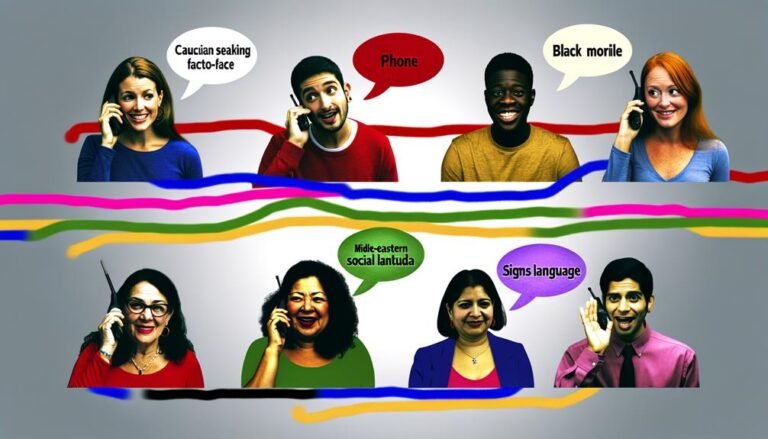Cultural Awareness as a Soft Skill
Understanding cultural awareness as an important soft skill helps you navigate diverse environments with respect and effective communication. It fosters positive interactions and boosts global awareness in our interconnected world. By valuing different perspectives and embracing diversity, you deepen connections and enhance teamwork. Through active listening and empathy, you cultivate a global mindset that appreciates cultural nuances. Start by engaging in cross-cultural training and seeking feedback to adapt your communication style. This skill is essential for personal growth and professional success. Embrace the benefits of cultural awareness to thrive in diverse settings.
Key Takeaways
- Cultural awareness enhances interpersonal relations and team dynamics.
- It fosters communication effectiveness and conflict resolution skills.
- Understanding diverse perspectives leads to inclusive environments.
- Valuing different cultures promotes mutual respect and collaboration.
- It is essential for global awareness and cross-cultural competence.
Importance of Cultural Awareness
Understanding the significance of cultural awareness is crucial for fostering positive interactions and mutual respect in diverse environments. Global awareness and cross-cultural competence are essential skills in today's interconnected world. By developing intercultural sensitivity and diversity appreciation, you enhance your ability to communicate effectively and build meaningful relationships with individuals from different backgrounds.
Cultural awareness goes beyond recognizing surface-level differences; it involves a deeper understanding of values, beliefs, and norms that shape people's behaviors. Embracing this knowledge allows you to navigate cultural nuances with respect and empathy. It opens doors to new perspectives and fosters a sense of inclusivity and belonging for everyone involved.
In a rapidly changing global landscape, the ability to adapt and thrive in diverse settings is a valuable asset. Cultivating cultural awareness not only enriches your personal growth but also contributes to creating harmonious environments where individuals from various cultures feel valued and understood. By embracing these principles, you pave the way for more meaningful and authentic connections in an increasingly interconnected world.
Benefits in Interpersonal Relations
Understanding diverse perspectives allows you to connect with others on a deeper level, creating meaningful relationships.
Enhancing your communication skills enables you to navigate conversations with sensitivity and empathy, fostering a more inclusive environment.
Embracing cultural awareness fosters mutual respect, laying the foundation for strong interpersonal connections.
Understanding Diverse Perspectives
Embracing diverse perspectives in interpersonal relations fosters empathy and understanding among individuals from different cultural backgrounds. By actively engaging in empathy training and participating in cross-cultural experiences, you can greatly enhance your ability to connect with others.
Understanding diverse perspectives offers a myriad of benefits in interpersonal relations:
- Enhanced Communication: Different viewpoints can enrich conversations and lead to more meaningful interactions.
- Increased Tolerance: Learning about diverse perspectives helps cultivate a more inclusive and tolerant mindset.
- Conflict Resolution Skills: Exposure to varied opinions can sharpen your conflict resolution abilities.
- Broadened Worldview: Embracing diverse perspectives allows you to see the world through different lenses, expanding your horizons.
Enhancing Communication Skills
To enhance your communication skills in interpersonal relations, actively listening and practicing empathy are key components that can greatly improve your ability to connect with others from diverse backgrounds.
Engaging in cross-cultural interactions requires a vital level of intercultural sensitivity, where being mindful of language nuances plays an essential role.
By actively listening to others and showing empathy, you demonstrate respect for their perspectives and experiences. Empathy building is a skill that can bridge gaps and foster deeper connections with individuals from different cultural backgrounds.
Understanding the importance of language nuances can help you communicate effectively and avoid misunderstandings in diverse settings.
Embracing these practices won't only enhance your communication skills but also enrich your interpersonal relationships.
Fostering Mutual Respect
Mutual respect forms the foundation for fostering healthy and meaningful interpersonal relationships. When cultivating mutual respect, it's essential to nurture mutual understanding and cross-cultural empathy.
Here are some ways fostering mutual respect benefits interpersonal relations:
- Enhanced Communication: Mutual respect encourages open and honest communication, leading to stronger connections.
- Conflict Resolution: Mutual respect fosters a safe environment where conflicts can be addressed constructively.
- Trust Building: Mutual respect builds trust, creating a solid foundation for relationships to thrive.
- Empathy Development: Fostering mutual respect promotes cross-cultural empathy, allowing individuals to understand and appreciate diverse perspectives.
Impact on Team Dynamics
Understanding and respecting cultural differences can greatly impact how a team collaborates and communicates effectively. When team members embrace cultural awareness, it enhances team cohesion and aids in conflict resolution. By valuing diverse perspectives and approaches, teams can navigate differences more harmoniously, leading to stronger bonds and smoother interactions.
Trust building is another key aspect influenced by cultural awareness within a team. Acknowledging and appreciating each other's backgrounds fosters trust among team members, creating a safe space for open communication and collaboration. Additionally, inclusivity initiatives that celebrate various cultures and traditions can help team members feel valued and respected, fostering a sense of belonging and unity.
Incorporating cultural awareness into team dynamics not only enriches the collaborative experience but also promotes a more positive and productive work environment. By recognizing and honoring each other's cultural differences, teams can leverage their diversity as a strength, leading to greater innovation and success.
Communication Enhancement Strategies
Enhancing your communication skills within a culturally diverse team requires active listening and adapting to different communication styles. To improve your communication effectiveness in such settings, consider the following strategies:
- Cross-cultural Training: Engage in cross-cultural training programs to gain insights into different cultural communication norms and practices.
- Intercultural Competence: Develop your intercultural competence by being open-minded and willing to learn from others' communication styles.
- Practice Empathy: Put yourself in others' shoes to understand their perspectives and communicate in a way that resonates with them.
- Seek Feedback: Regularly seek feedback from team members to understand how your communication style is perceived and make necessary adjustments.
Overcoming Cultural Barriers
How can you effectively navigate and address cultural barriers within a diverse team environment?
Cultural barriers can sometimes hinder effective communication and collaboration within a team. To overcome these barriers, it's essential to focus on building connections and bridging gaps between team members from different cultural backgrounds.
One key strategy is to foster open and honest communication by encouraging team members to share their unique perspectives, beliefs, and values. This can help create a more inclusive environment where everyone feels valued and respected.
Another important aspect of overcoming cultural barriers is to practice active listening. By listening attentively to what others have to say, you show respect for their viewpoints and demonstrate your willingness to understand and learn from them.
Additionally, taking the time to educate yourself about different cultures and traditions can help you gain a deeper appreciation for diversity and enhance your ability to work effectively in a multicultural team.
Cultivating a Global Mindset
Cultivating a global mindset involves embracing diversity and actively seeking to understand different perspectives and cultural nuances. To develop this mindset, adopting a global perspective and engaging in effective cross-cultural communication are crucial.
Here are some practical steps to help you cultivate a global mindset:
- Embrace Diversity: Value the differences in cultures, beliefs, and traditions you encounter.
- Stay Curious: Be open to learning about new cultures and exploring different ways of thinking.
- Practice Empathy: Put yourself in someone else's shoes to understand their perspective better.
- Communicate Effectively: Pay attention to non-verbal cues and adapt your communication style to bridge cultural gaps.
Case Studies on Cultural Competence
By exploring real-life scenarios, we can gain valuable insights into the significance of cultural competence in diverse settings. Understanding cross-cultural challenges and showcasing success stories exemplifies the importance of cultural competence and empathy building. Let's investigate a few case studies that highlight these aspects:
| Case Study | Key Learnings |
|---|---|
| A. Company X expanding into Asian markets | Overcoming language barriers and adapting marketing strategies led to successful market penetration. |
| B. Nonprofit organization empowering indigenous communities | Building trust through active listening and respect for local customs resulted in impactful community projects. |
| C. Educational institution promoting cultural exchange | Encouraging open dialogues and celebrating diversity fostered a harmonious learning environment. |
| D. Tech startup with a multicultural team | Embracing different perspectives and communication styles enhanced innovation and problem-solving capabilities. |
| E. Healthcare provider serving diverse patients | Customizing care approaches based on cultural backgrounds improved patient outcomes and satisfaction. |
These case studies demonstrate the positive outcomes that cultural competence can bring in various professional settings.
Continuous Learning and Adaptation
To adapt successfully in diverse environments, embrace continuous learning as a means to maneuver cultural complexities and foster growth. Adaptation strategies are pivotal for traversing cross-cultural interactions effectively. Here are some key strategies to help you continuously learn and adapt:
- Engage in Cross-Cultural Training: Attend workshops or courses to develop a deeper understanding of different cultures.
- Seek Feedback: Regularly ask for feedback from individuals with diverse backgrounds to gain insights into your cultural competency.
- Stay Curious: Approach new cultural experiences with an open mind and a necessity to learn.
- Practice Empathy: Put yourself in others' shoes to understand different perspectives and behaviors better.
Conclusion
To sum up, embracing cultural awareness as a soft skill is crucial in today's diverse world. By understanding and respecting different cultural perspectives, you can build stronger relationships, enhance communication, and foster teamwork.
For instance, imagine a team where members value and celebrate each other's cultural differences, leading to increased creativity and collaboration.
So, keep learning, adapting, and cultivating a global mindset to truly thrive in our interconnected world.








